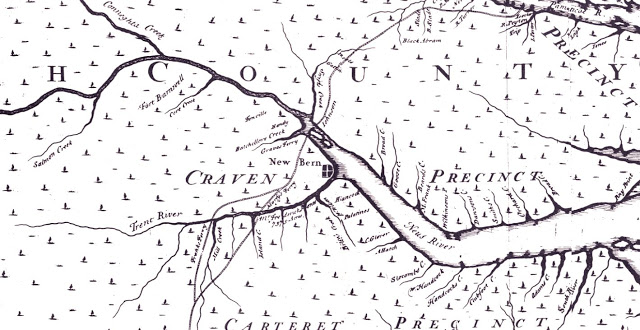Our Palatines to America treasurer, Margie Weiler, suggested
that I include information in this blog about the 1710 settlement of New Bern,
North Carolina. I have previously written about the
1766 North Carolina settlement of Germans in Salem. However the New Bern settlement deserves its
own mention.
Christoph von Graffenried, a native of Bern, Switzerland,
born in 1661 and Franz Ludwig Michel, both part of the Ritter Company, wanted to
establish a Swiss colony in the New World.
Queen Anne of England, facing a flood of Palatine immigrants made an
offer of land and support for the settlement plans if they would agree to
include Palatines among those they transported to the New World.
In September of 1709, Parliament granted Graffenried and Michel more than 13,000 acres of land in the Carolinas, with a promise of assistance once they arrived. As a result, 650 Palatines, led by John Lawson and Michael Gale, sailed from England in January 1710. During the thirteen week voyage, they lost about one half of the Palatines as a result of the harsh conditions of the trip. When they arrived in North Carolina at the juncture of the Neuse and Trent rivers, they found that no provisions were waiting for them and no work had been done to provide shelter for them in the settlement at New Bern.
Conditions did not improve until Graffenried arrived in
September 1710 with about 100 Swiss settlers.
He had the land surveyed, forests cleared and houses erected. Within
eighteen months, the community seemed to be well established. Unfortunately this good fortune did not
continue for long.
The Tuscarora Indians who had inhabited the area until the
arrival of European settlers, began a campaign to rid their native lands of
those intruders. In Early September
1711, Graffenried and surveyor John Lawson, who had led the initial group of
Palatine settlers to New Bern, set off to explore the area north of New Bern. The Tuscarora captured both, killing
Lawson. They let Graffenried go free
because they believed that he was the governor.
While Graffenried was journeying back to New Bern, the
Tuscarora attacked the white communities along the Neuse and Pamlico Rivers,
killing many of the settlers. They
destroyed houses and crops and took away livestock.
Graffenried never recovered financially from the war with
the Tuscarora, and many of the original Palatines dispersed among the surviving
English communities of North Carolina. Graffenried returned to Europe.


This article helped me a lot! I find your posts very interesting to read, and I am grateful for your work. Very happy right now :) Thank you, once again. - John Michael Saylor
ReplyDelete